新目标英语八年级下册各单元重点总结
春人教新目标英语八年级下册Unit1重点知识讲解
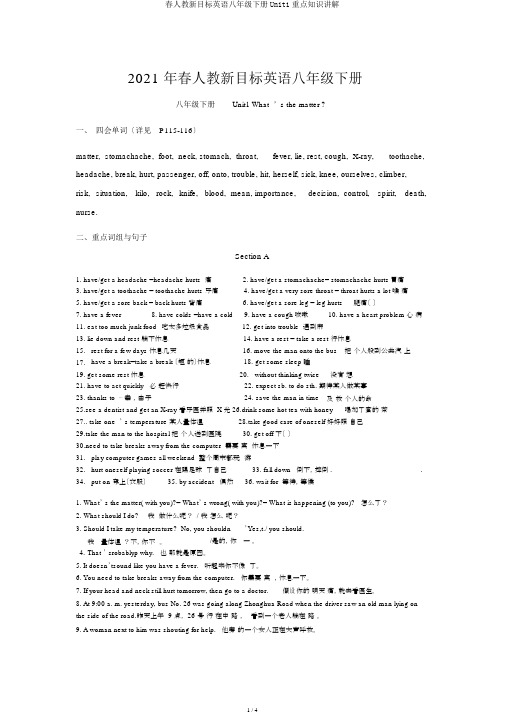
2021 年春人教新目标英语八年级下册八年级下册Unit1 What ’s the matter ?一、四会单词〔详见P115-116〕matter, stomachache, foot, neck, stomach, throat, fever, lie, rest, cough, X-ray,toothache, headache, break, hurt, passenger, off, onto, trouble, hit, herself, sick, knee, ourselves, climber, risk, situation, kilo, rock, knife, blood, mean, importance, decision, control, spirit, death, nurse.二、重点词组与句子Section A1. have/get a headache =headache hurts 痛2. have/get a stomachache= stomachache hurts胃痛3. have/get a toothache = toothache hurts 牙痛4. have/get a very sore throat = throat hurts a lot 喉痛5. have/get a sore back = back hurts 背痛6. have/get a sore leg = leg hurts腿痛〔〕7. have a fever8. have colds =have a cold9. have a cough咳嗽10. have a heart problem 心病11. eat too much junk food吃太多垃圾食品12. get into trouble 遇到麻13. lie down and rest 躺下休息14. have a rest = take a rest行休息15.rest for a few days 休息几天16. move the man onto the bus把个人般到公共汽上17.have a break=take a break 〔短的〕休息18. get some sleep睡19. get some rest 休息20. without thinking twice没有想21. have to act quickly必赶快行22. expect sb. to do sth. 期待某人做某事23. thanks to ⋯幸,由于24. save the man in time及救个人的命25.see a dentist and get an X-ray 看牙医并照 X 光 26.drink some hot tea with honey喝加了蜜的茶27.. take one ’ s temperature某人量体温28.take good care of oneself 好好照自己29.take the man to the hospital 把个人送到医院30. get off 下〔〕30.need to take breaks away from the computer 需要离休息一下31.play computer games all weekend整个周末都玩游32.hurt oneself playing soccer 在踢足球了自己33. fall down 倒下,摔倒 ..34.put on 穿上〔衣服〕35. by accident 偶然36. wait for 等待,等候1. What’ s the matter( with you)?= What’ s wrong( with you)?= What is happening (to you)? 怎么了?2. What should I do?我做什么呢? / 我怎么呢?3. Should I take my temperature? No, you shouldn’Yes,t./ you should.我量体温?不,你不。
新目标八年级下册英语Unit4 why don39;t you talk to your parents重点知识讲解
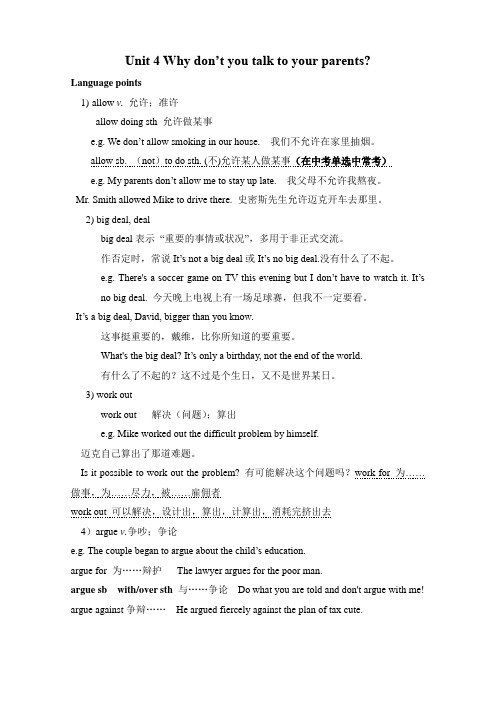
Unit 4 Why don’t you talk to your parents?Language points1)allow v.允许;准许allow doing sth 允许做某事e.g. We don’t allow smoking in our house. 我们不允许在家里抽烟。
allow sb. (not)to do sth. (不)允许某人做某事(在中考单选中常考)e.g. My parents don’t allow me to stay up late. 我父母不允许我熬夜。
Mr. Smith allowed Mike to drive there. 史密斯先生允许迈克开车去那里。
2) big deal, dealbig deal表示“重要的事情或状况”,多用于非正式交流。
作否定时,常说It’s not a big deal或It’s no big deal.没有什么了不起。
e.g. There's a soccer game on TV this evening but I don’t have to watch it. It’sno big deal. 今天晚上电视上有一场足球赛,但我不一定要看。
It’s a big deal, David, bigger than you know.这事挺重要的,戴维,比你所知道的要重要。
What's the big deal? It’s only a birthday, not the end of the world.有什么了不起的?这不过是个生日,又不是世界某日。
3) work outwork out 解决(问题);算出e.g. Mike worked out the difficult problem by himself.迈克自己算出了那道难题。
Is it possible to work out the problem? 有可能解决这个问题吗?work for 为……做事,为……尽力,被……雇佣者work out 可以解决,设计出,算出,计算出,消耗完挤出去4)argue v.争吵;争论e.g. The couple began to argue about the child’s education.argue for 为……辩护The lawyer argues for the poor man.argue sb with/over sth 与……争论Do what you are told and don't argue with me! argue against争辩……He argued fiercely against the plan of tax cute.5). proper adj.正确的;恰当的e.g. It’s not proper to visit a friend too late in the evening.太晚了,去看朋友不合适。
新目标英语八年级下册Unit1Willpeoplehaverobots知识点
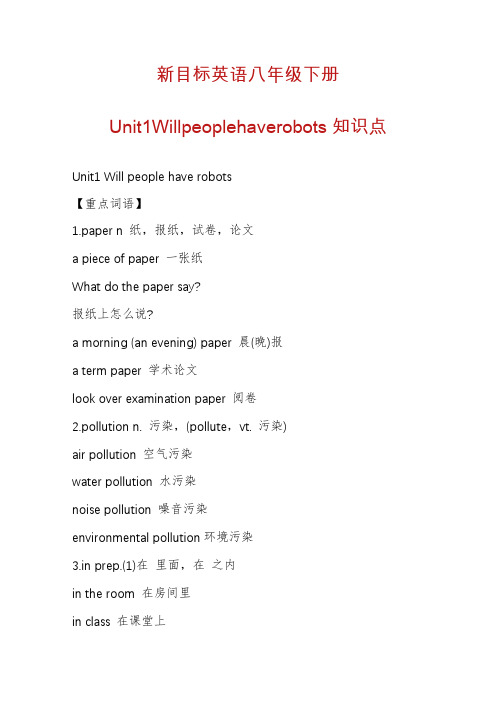
新目标英语八年级下册Unit1Willpeoplehaverobots知识点Unit1 Will people have robots【重点词语】1.paper n 纸,报纸,试卷,论文a piece of paper 一张纸What do the paper say?报纸上怎么说?a morning (an evening) paper 晨(晚)报a term paper 学术论文look over examination paper 阅卷2.pollution n. 污染,(pollute,vt. 污染)air pollution 空气污染water pollution 水污染noise pollution 噪音污染environmental pollution环境污染3.in prep.(1)在里面,在之内in the room 在房间里in class 在课堂上(2)在(某段时间)之间in the morning 在早上in the past 在过去I′ll come back in a day or two我过一两天就会回来in,after,later 接时间段,都可表示“(一段时间)之后”,它们有什么区别呢?①“in+一段时间”指“(将来的)一段时间之后”。
What will you be in five years?五年之后你干什么?We’ll start off in ten minutes.我们十分钟后出发。
②“after+一段时间”或“一段时间+later”表示“(在过去某个时间看来)一段时间之后”。
He went home after two days.他两天后回家了。
Three years later,she had a baby.三年后,她生了一个婴儿。
4.less adj. 较少的;少量的(little的比较级)They buy less beer and fewer cigarettes now现在他们买的啤酒和香烟比以前少了。
八年级下册英语知识点[新目标八年级英语知识点总结]
![八年级下册英语知识点[新目标八年级英语知识点总结]](https://img.taocdn.com/s3/m/fb83419d50e79b89680203d8ce2f0066f53364ab.png)
新目标八年级英语知识点总结新目标八年级英语知识点总结(一) 1、too…to… (1)too…to句型,形式上是肯定的,但表达否定意义,意为“太…而不能…”。
too后接形容词或副词的原级,to后接动词不定式。
He i too young to go to chool. 他太小了而不能去上学。
(2)too…to…表否定意义时,可与o…that…或not enough to互换。
1)too…to…结构同o…that结构的互换。
too…to…结构是一个简单句;而o…that是一个复合句,o后接形容词或副词,that 后接从句。
转换时that后的从句要用否定形式。
The man i too old to go to work. = The man i o old that he can’t go to work. 这个人岁数太大,不能去工作了。
2)too…to…结构同not…enough to…结构的互换。
enough前的形容词或副词必须与too后的形容词或副词意义相反。
The bo某 i too heavy for him to lift. = The bo某 i not light enough for him to lift.这个盒子太重了,他拿不动。
(3)too…to…句型在以下三种情况下表达肯定意义。
1)当too前有not;never;nothing等表示否定意义的词时,too…to…就不表示否定意义。
One i never too old to learn. 活到老,学到老。
2)如果too…to…结构前出现了only,则加强肯定语气,就无否定意义了。
only too 相当于very或very much。
I hall be only too pleaed to go home. 我将非常高兴地回家。
3)当too后有ad;happy;glad;pleaed等表示情感的形容词,则表示肯定意义。
He i too ad to hear the tory. 听到这个故事,他感到太伤心了。
人教版新目标英语八年级下册英语unit4重点短语和句子分析
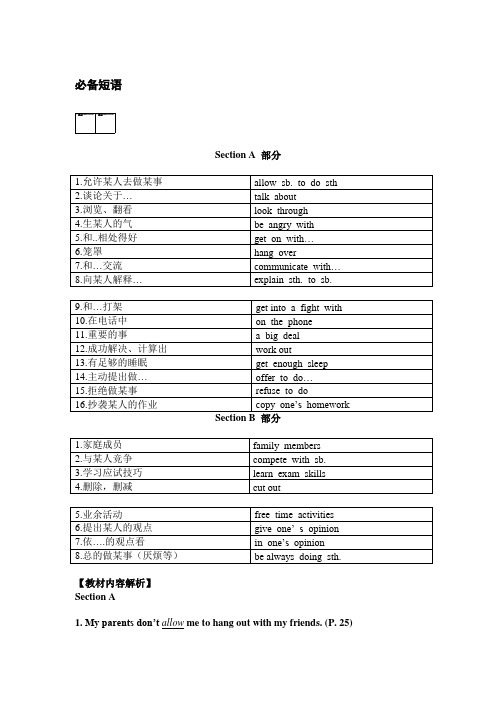
必备短语Section A 部分【教材内容解析】Section A1. My parents don’t allow me to hang out with my friends. (P. 25)① allow doing sth. 允许做某事翻译:The shopkeeper (店员) doesn’t allow smoking in any corner of the shop.__________________________________________② allow sb. to do sth. 允许某人做某事翻译:His parents allow him to play computer games if he finishes his homework. ____________________________________________2. I got into a fight with my best friend. (P. 25)get into a fight with sb.意为“和某人打架”,相当于have a fight with sb.或者fight with sb.。
翻译:He got drunk (醉酒的) and got into a fight with Jim._________________________________________3. What’s wrong? (P. 25)What’s wrong?意为“怎么了?”,用来询问对方有什么问题或者不顺心的事,What’s wrong with...?意为“……怎么了?”,后接sb.或者sth.,用来询问某人或者某物怎么了?---What’s wrong with you, Jim?---I left my umbrella on the bus.【拓展】询问“怎么了?”,主要有以下几种句型:What’s wrong (with sb./sth.)?What’s the matter (with sb./sth.)?What’s the trouble (with sb./sth.)?What’s up (with sb./sth.)?4. I’m really tired because I studied until midnight last night. (P. 25)until表示“直到”和延续性动词连用,意为一个动作一直持续到某个点为止;同短暂性行动连用时,用于“not...until”结构中,表示“直到……才……”。
新目标八年级下册英语各单元重点语法汇总

新目标八年级下册英语各单元重点语法汇总一. 询问健康及麻烦的表达方法1. 常用结构:What’s the matter (with sb.)?(sb.)怎么了?What’s wrong (with sb.)?(sb.)怎么了?What’s the trouble with sb? sb.出什么事了?What happened to sb? sb.发生了什么事?Are you OK? 你没事吧?Is there anything wrong with sb.?sb.有不舒服/麻烦吗?2. 要表达身体疼痛或不舒服,可用以下结构:①sb. have/has 病症The twins have colds.双胞胎感冒了。
②sb.have/has a headache/toothache/stomachache/backache. She had a stomachache last night. 她昨晚肚子痛。
③sb. have/has a sore 发病部位He has a sore throat. 他喉咙痛。
④sb. hurt(s) 身体部位或反身代词He hurt his leg. 他的腿受伤了。
⑤某部位hurt(s).My head hurts badly. 我头痛得厉害。
⑥sb. have/has a pain in one’s 身体部位I have a pain in my chest. 我胸口痛。
⑦(There is) something wrong with one’s 身体部位There is something wrong with my right eye. 我的右眼有毛病。
⑧其他表达方式She has a heart trouble. 她有心脏病。
He got hit on the head. 他头部受到了撞击。
She cut her finger. 她割破手指了。
二.情态动词should1. should为情态动词,意为“应该;应当”,否定式为shouldn’t,其后接动词原形,无人称和数的变化。
新目标八年级英语下册Unit3重点单词讲解

1)Our country develops very quickly. 2)Teenagers should develop good reading habits. The
builders are developing that part of the city. 3)China is a developing country. America is a
7.provide v. 提供,供应 常用短语:provide sb.with sth. /provide sth. for sb. 1)The sun provides light and heat fotheir children with food and clothes. 3)The parents provide food and clothes for their children.
1.floor n. 地板,层 1)Please sweep the floor every day. 2)He lives on the second floor. 2.neither adv. 也不,两者都不(置于单数名词之前),
pron.两者都不,双方均不 Neither did I.是倒装结构相当于“neither+助动词/情态动 词/系动词+主语”结构,表示前面叙述的否定情况也是和
2020年春人教新目标英语八年级下册Unit7知识点归纳总结
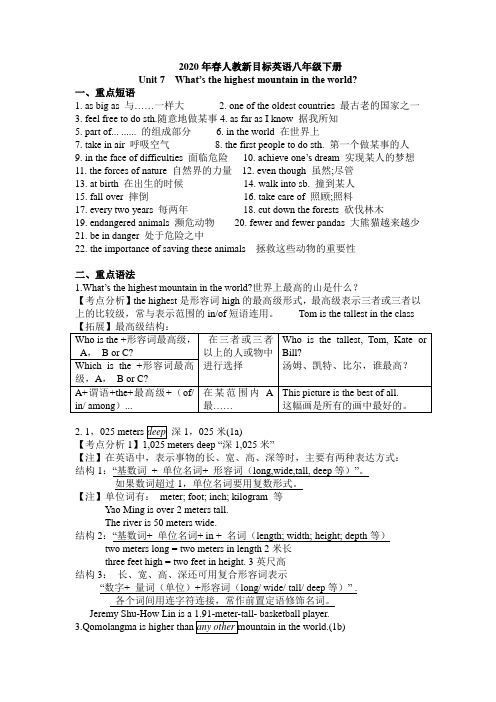
2020年春人教新目标英语八年级下册Unit 7 What’s the highest mountain in the world?一、重点短语1. as big as 与……一样大2. one of the oldest countries 最古老的国家之一3. feel free to do sth.随意地做某事4. as far as I know 据我所知5. part of... ...... 的组成部分6. in the world 在世界上7. take in air 呼吸空气 8. the first people to do sth. 第一个做某事的人9. in the face of difficulties 面临危险 10. achieve one’s dream 实现某人的梦想11. the forces of nature 自然界的力量 12. even though 虽然;尽管13. at birth 在出生的时候 14. walk into sb. 撞到某人15. fall over 摔倒 16. take care of 照顾;照料17. every two years 每两年 18. cut down the forests 砍伐林木19. endangered animals 濒危动物 20. fewer and fewer pandas 大熊猫越来越少21. be in danger 处于危险之中22. the importance of saving these animals 拯救这些动物的重要性二、重点语法1.What’s the highest mountain in the world?世界上最高的山是什么?【考点分析】the highest 是形容词high 的最高级形式,最高级表示三者或三者以上的比较级,常与表示范围的in/of 短语连用。
Tom is the tallest in the class2. 1,深1,025米(1a)【考点分析1】深1,025米”【注】在英语中,表示事物的长、宽、高、深等时,主要有两种表达方式:结构1:“基数词 + 单位名词+ 形容词(long,wide,tall, deep 等)”。
人教版八年级下册各单元英语语法解析知识重点总结

新目标英语八年级(下)重点短语及句型总Unit 1 Will people have robots?1. fewer people 更少的人(fewer 修饰名词复数,表示否定)2. less free time 更少的空闲时间(less 修饰不可数名词,表示否定)3. in ten years 10年后(in 的时间短语用于将来时,提问用 How soon)4. fall in love with … 爱上……例:When I met Mr. Xu for the first time, I fell inlove with him at once.当我第一次见到许老师,我立刻爱上他。
5. live alone 单独居住6. feel lonely 感到孤独(比较:live alone/ go alone 等)The girl walked alone along the street, but shedidn't feel lonely.那女孩独自沿着街道走,但她并不感到孤独。
7. keep/ feed a pet pig 养一头宠物猪8. fly to the moon 飞上月球9. hundreds of + 复数数百/几百(概数,类似还有 thousands of;millions of)10. the same as 和……相同11. A be different from B A与B不同(= There is a difference/ Thgere aredifferences between A and B)12. wake up 醒来(wake sb. up 表示“唤醒某人”)13. get bored 变得厌倦(get/ become 是连系动词,后跟形容词如 tired/angry/ excited 等)14. go skating 去滑冰(类似还有 go hiking/ fishing /skating/ bike riding 等)15. lots of/ a lot of 许多(修饰可数名词、不可数名词都可以)16. at the weekends 在周末17. study at home on computers 在家通过电脑学习18. agree with sb. 同意某人(的意见)19. I don't agree. = I disagree. 我不同意。
新版新目标英语八年级下册unit2知识点总结
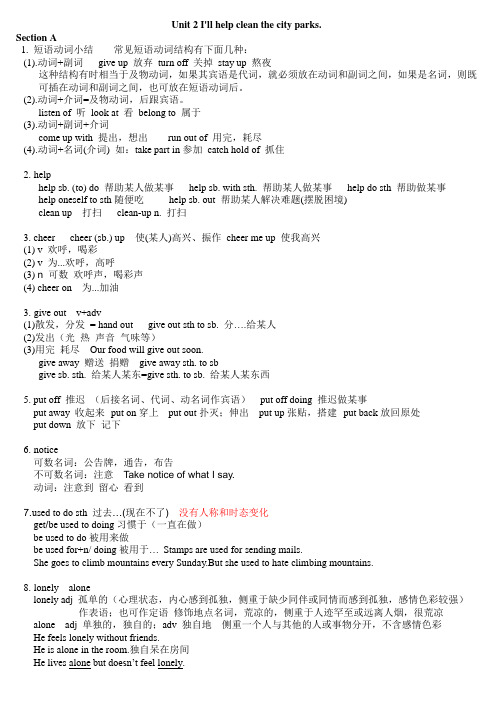
Unit 2 I'll help clean the city parks.Section A1. 短语动词小结常见短语动词结构有下面几种:(1).动词+副词give up 放弃turn off 关掉stay up 熬夜这种结构有时相当于及物动词,如果其宾语是代词,就必须放在动词和副词之间,如果是名词,则既可插在动词和副词之间,也可放在短语动词后。
(2).动词+介词=及物动词,后跟宾语。
listen of 听look at 看belong to 属于(3).动词+副词+介词come up with 提出,想出run out of 用完,耗尽(4).动词+名词(介词) 如:take part in参加catch hold of 抓住2.helphelp sb. (to) do 帮助某人做某事help sb. with sth. 帮助某人做某事help do sth 帮助做某事help oneself to sth随便吃help sb. out 帮助某人解决难题(摆脱困境)clean up 打扫clean-up n. 打扫3. cheer cheer (sb.) up 使(某人)高兴、振作cheer me up 使我高兴(1) v 欢呼,喝彩(2) v 为...欢呼,高呼(3) n 可数欢呼声,喝彩声(4) cheer on 为...加油3.give out v+adv(1)散发,分发= hand out give out sth to sb. 分….给某人(2)发出(光热声音气味等)(3)用完耗尽Our food will give out soon.give away 赠送捐赠give away sth. to sbgive sb. sth. 给某人某东=give sth. to sb. 给某人某东西5. put off 推迟(后接名词、代词、动名词作宾语)put off doing 推迟做某事put away 收起来put on穿上put out扑灭;伸出put up张贴,搭建put back放回原处put down 放下记下6.notice可数名词:公告牌,通告,布告不可数名词:注意Take notice of what I say.动词:注意到留心看到ed to do sth过去…(现在不了) 没有人称和时态变化get/be used to doing习惯于(一直在做)be used to do被用来做be used for+n/ doing被用于…Stamps are used for sending mails.She goes to climb mountains every Sunday.But she used to hate climbing mountains.8.lonely alonelonely adj 孤单的(心理状态,内心感到孤独,侧重于缺少同伴或同情而感到孤独,感情色彩较强)作表语;也可作定语修饰地点名词,荒凉的,侧重于人迹罕至或远离人烟,很荒凉alone adj 单独的,独自的;adv 独自地侧重一个人与其他的人或事物分开,不含感情色彩He feels lonely without friends.He is alone in the room.独自呆在房间He lives alone but doesn’t feel lonely.9.volunteer(1)可数名词志愿者(2)adj. 自愿的(3) v volunteer to do sth 志愿效劳、主动贡献They are the Chinese People’s V olunteers. 他们是中国人民志愿军。
2020年春人教新目标英语八年级下册Unit4-5知识点总结

2020年春人教新目标英语八年级下册Unit 4 Why don’t you talk to your parents?1..用于提建议的句型有:What about doing sth ?=How about doing sth?(1). 同意对方的建议时,一般用:….怎么样?.Let’s do sth . 让我们一起做某事吧。
Shall we/I do sth? 我们做…好吗?had better do/not do sth 最好做/不做某事Will/Would you please do sth 请你做…好吗?Would you like to do sth? 你想去做某事吗?Would you mind doing sth?你介意做某事吗?Why don’t you do sth?= Why not do sth?为什么不呢?◆Good idea./ That’s good idea. 好主意◆OK/ All right./ Great 好/ 行/太好了◆Yes, please ./ I’d love t o 是的/ 我愿意◆I agree with you 我同意你的看法◆No problem 没问题◆Sure/ Of course/ Certainly 当然可以◆Yes, I think so 对,我也这样想(2).对对方的帮助或要求表示委婉谢绝时,一般用:◆I don’t think so 我认为不是这样◆Sorry, I can’t对不起,我不能◆I’d love to, but…◆I’m afraid…我愿意,但恐怕……2. allow doing sth 允许做某事allow sb. to do sth 允许某人做某事be allowed to do sth 被允许做某事allow与let的辨析:allow指“允许”,表示“默许,听任,不加阻止”,allow sb to do sth 允许某人做某事。
新版新目标英语八年级下册Unit5知识点总结
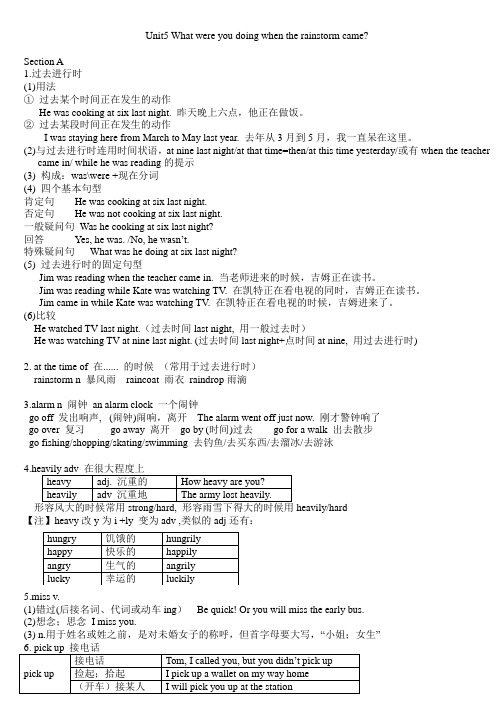
Unit5 What were you doing when the rainstorm came?Section A1.过去进行时(1)用法①过去某个时间正在发生的动作He was cooking at six last night. 昨天晚上六点,他正在做饭。
②过去某段时间正在发生的动作I was staying here from March to May last year. 去年从3月到5月,我一直呆在这里。
(2)与过去进行时连用时间状语,at nine last night/at that time=then/at this time yesterday/或有when the teachercame in/ while he was reading的提示(3) 构成:was\were +现在分词(4) 四个基本句型肯定句He was cooking at six last night.否定句He was not cooking at six last night.一般疑问句Was he cooking at six last night?回答Yes, he was. /No, he wasn’t.特殊疑问句What was he doing at six last night?(5) 过去进行时的固定句型Jim was reading when the teacher came in. 当老师进来的时候,吉姆正在读书。
Jim was reading while Kate was watching TV. 在凯特正在看电视的同时,吉姆正在读书。
Jim came in while Kate was watching TV. 在凯特正在看电视的时候,吉姆进来了。
(6)比较He watched TV last night.(过去时间last night, 用一般过去时)He was watching TV at nine last night. (过去时间last night+点时间at nine, 用过去进行时)2. at the time of 在...... 的时候(常用于过去进行时)rainstorm n 暴风雨raincoat 雨衣raindrop雨滴3.alarm n 闹钟an alarm clock 一个闹钟go off 发出响声, (闹钟)闹响,离开The alarm went off just now. 刚才警钟响了go over 复习go away 离开go by (时间)过去go for a walk 出去散步go fishing/shopping/skating/swimming 去钓鱼/去买东西/去溜冰/去游泳heavily/hard【注】heavy改y为i +ly 变为adv ,类似的adj还有:5.miss v.(1)错过(后接名词、代词或动车ing)Be quick! Or you will miss the early bus.(2)想念;思念I miss you.(3) n.用于姓名或姓之前,是对未婚女子的称呼,但首字母要大写,“小姐;女生”7.strange adj. 奇怪的 →strangely adv 奇怪地 →stranger n 陌生人8. With no light outside, it felt like midnight. 外面没有一丝光亮,让人感觉这是在午夜。
人教新目标八年级英语下册Unit 2 知识点总结
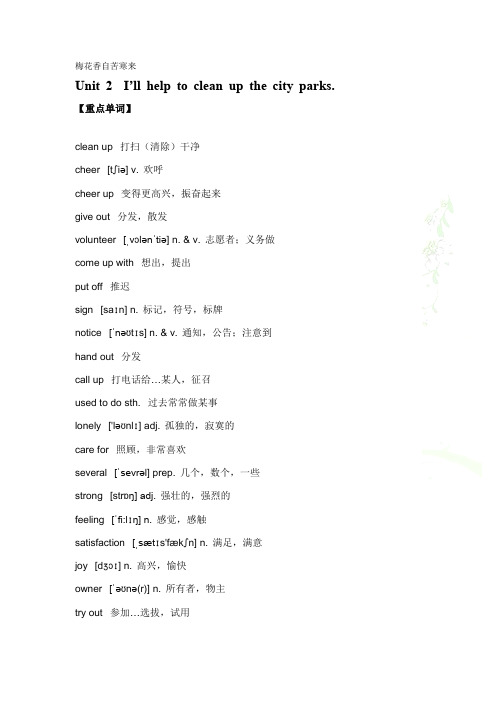
梅花香自苦寒来Unit 2 I’ll help to clean up the city parks.【重点单词】clean up 打扫(清除)干净cheer [tʃiə] v. 欢呼cheer up 变得更高兴,振奋起来give out 分发,散发volunteer [ˌvɔlənˈtiə] n. & v. 志愿者;义务做come up with 想出,提出put off 推迟sign [saɪn] n. 标记,符号,标牌notice [ˈnəʊtɪs] n. & v. 通知,公告;注意到hand out 分发call up 打电话给…某人,征召used to do sth. 过去常常做某事lonely ['ləʊnlɪ] adj. 孤独的,寂寞的care for 照顾,非常喜欢several [ˈsevrəl] prep. 几个,数个,一些strong [strɒŋ] adj. 强壮的,强烈的feeling [ˈfi:lɪŋ] n. 感觉,感触satisfaction [ˌsætɪs'fækʃn] n. 满足,满意joy [dʒɔɪ] n. 高兴,愉快owner [ˈəʊnə(r)] n. 所有者,物主try out 参加…选拔,试用journey ['dʒɜ:nɪ] n. (尤指长途)旅行,行程raise [reɪz] v. 抬起,举起,筹集,征集alone [əˈləun] adv. 独自地,孤独地repair [riˈpɛə] v. 修理,修补fix [fiks] v. 修理,安装fix up 修理,修补give away 赠送,捐赠take after (外貌或行为)像broken ['brəʊkən] adj. 破损的,残缺的wheel [wi:l] n. & v. 轮子,车轮;旋转letter [ˈletə] n. 信件,字母Miss [mɪs] n. 小姐set up 建立,设立disabled [disˈeibəld] adj. 有残疾的,丧失能力的make a difference 影响,有作用blind [blaɪnd] adj. 盲的,盲目的,失明的deaf [def] adj. 聋的imagine [ɪˈmædʒɪn] v. 想象,设想difficulty ['dɪfɪkəltɪ] n. 困难open [ˈəʊpən] v. 打开door [dɔ:] n. 门carry ['kærɪ] v. 携带,搬运train [treɪn] v. 训练,培养training [ˈtreɪnɪŋ] n. 训练,培训excited [ɪkˈsaɪtɪd] adj. 激动的,兴奋的kindness [ˈkaɪndnəs] n. 仁慈,善良,亲切,善意clever [ˈklevə] adj. 聪明的,机灵的understand [ˌʌndəˈstænd] v. 懂,理解change [tʃeɪndʒ] n. & v. 改变interest ['ɪntrəst] n. & v. 感兴趣;兴趣sir [sɜ:(r)] n. 先生madam ['mædəm] n. 夫人,女士【重点短语】1.Clean-Up Day 清洁日2. an old people’s home 养老院3. help out with sth. 帮助解决困难4. used to 过去常常......5. care for 关心;照顾6. the look of joy 快乐的表情7. at the age of 在......岁时8.clean up 打扫(或清除)干净9. cheer up (使)变得更高兴;振奋10. give out 分发;散发11. come up with 想出;提出12. make a plan 制订计划13. make some notices 做些公告牌14. try out 试用;试行15. work for 为…工作;为…. 效力16. put up 建造;举起;张贴17. hand out 分发;散发;发给18. call up 打电话;召集19. put off 推迟;延迟20. for example 比如;例如21. raise money 筹钱;募捐22. take after 与......相像;像23. give away 赠送;捐赠24. fix up 修理;修补;解决25. be similar to 与……相似26. set up 建立;设立27. disabled people 残疾人28. make a difference 影响;有作用29. be able to 能够30. after-school reading program 课外阅读项目【重点句型】1. The boy could give out food at the food bank. 这个男孩可以在食品救济站分发食物。
人教版新目标英语八年级下册:Unit 9《Have you ever been to a museum》知识点梳理及单元复习

Unit 9知识点梳理和单元复习附参考答案1. 单元重点短语归纳:2. Have you ever been to a science museum? 你曾经去过科学博物馆吗?【重点】【辨析】have/has been to;have / has gone to ;have/ has been in;(1). have/ has been to 表示“某人曾经去过某地”强调现在已经回来了,不在那里了。
E.g.: We have been to Qingdao. 我们去过青岛。
(现在不在青岛)(2). have gone to表示“某人到某地去了”,强调现在还没有回来,可能在那里或途中。
E.g.: They have gone to Sydney. 他们去悉尼了。
(现在在悉尼或途中)(3). have been in +地点:表示“某人在某地待了很长时间”,常与时间段搭配。
E.g.: I have been in Nanchang for three years. 我在南昌待了3年了。
How long have you been in China? 你在中国待了多长时间?3. 一般过去时与现在完成时的用法比较【重点】&【难点】(1). 一般过去时表示过去某个时间发生的事、存在的状态或经常发生的动作。
说话的侧重点只是陈述一件过去的事情,不强调对现在产生的影响。
E.g.: He visited Guilin in 1998. 在1998年他参观过桂林。
(只说明去桂林的时间)(2). 现在完成时表示动作发生在过去,对现在造成了影响或产生了结果。
不能与确定的过去时间状语连用。
E.g.: Jill has bought a new computer. 吉尔买了一台新电脑。
I have taught here for fifteen years. 我在这儿教学已经15年了。
I have seen the film. 我看过这部电影。
八年级英语下unit6单元知识总结新目标(全文5篇)

八年级英语下unit6单元知识总结新目标(全文5篇)第一篇:八年级英语下 unit6 单元知识总结新目标Unit 6 How long have you been collecting shells?一.【单元目标】Ⅰ.单词与短语collect marathon skatepairsince raiseseveralstampkitemonsterglobeanyonestore cake particularlycollector common extra topiccapital thousand quite certain missin fact其实;实际上run out of用完;用尽by the way顺便;附带说说be interested in对……感兴趣more than比……多make a list of列清单thanks for doing sth.感谢某人做了某事think of / about sth.想起某事Ⅱ.目标句型:1.How long have you been doing…?2.I’ve been doing…since…3.How long did sb.do…?4.He / She did sth.for…5.What do you collect?6.When did you start?7.How many do you have?8.What do you like to collect in the future?9.What is the most common/unusual/interesting hobby?Ⅲ.语法现在完成进行时二.【重难点分析】1.现在完成进行时构成:肯定句:主语 + have / has been + doing否定句:主语+have/has+not+been+doing一般疑问句:Have/Has+主语+been+doing?现在完成进行时表达“某一动作从过去开始一直持续到现在,有可能还要持续下去”,现在完成进行时的句子中多用延续性动词,如:live,learn,study,work等。
新版新目标英语八年级下册unit-7知识点总结
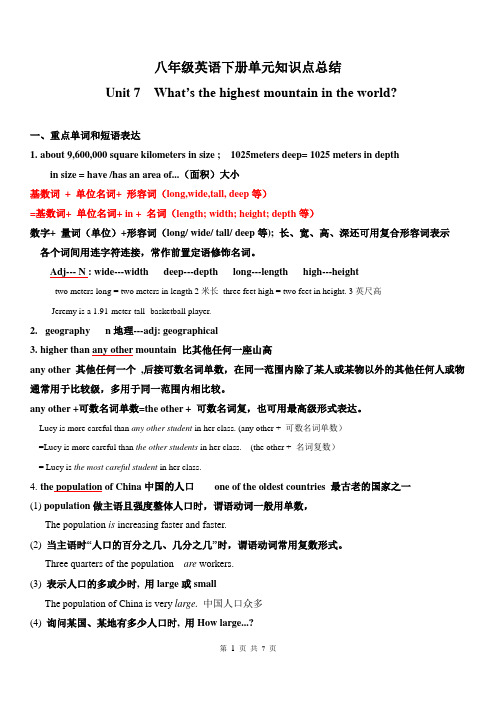
八年级英语下册单元知识点总结Unit 7 What’s the highest mountain in the world?一、重点单词和短语表达1.about 9,600,000 square kilometers in size ; 1025meters deep= 1025 meters in depthin size = have /has an area of...(面积)大小基数词+ 单位名词+ 形容词(long,wide,tall, deep等)=基数词+ 单位名词+ in + 名词(length; width; height; depth等)数字+ 量词(单位)+形容词(long/ wide/ tall/ deep等); 长、宽、高、深还可用复合形容词表示各个词间用连字符连接,常作前置定语修饰名词。
Adj--- N : wide---width deep---depth long---length high---heighttwo meters long = two meters in length 2米长three feet high = two feet in height. 3英尺高Jeremy is a 1.91-meter-tall- basketball player.2.geography n地理---adj: geographical3.higher than any other mountain 比其他任何一座山高any other 其他任何一个,后接可数名词单数,在同一范围内除了某人或某物以外的其他任何人或物通常用于比较级,多用于同一范围内相比较。
any other +可数名词单数=the other + 可数名词复,也可用最高级形式表达。
Lucy is more careful than any other student in her class. (any other + 可数名词单数)=Lucy is more careful than the other students in her class. (the other + 名词复数)= Lucy is the most careful student in her class.4.the population of China中国的人口one of the oldest countries 最古老的国家之一(1) population做主语且强度整体人口时,谓语动词一般用单数,The population is increasing faster and faster.(2) 当主语时“人口的百分之几、几分之几”时,谓语动词常用复数形式。
人教新目标英语八年级下册Unit-4---5重难点知识复习

重难点知识复习Unit 4 Why don’t you talk to your parents?一.词型转换。
relation n.关系----relationship n.关系communicate v.交流-----communication n.交流argue v.争执---- argument n.争执cloud n云--- cloudy adj.多云的proper adj.合适的---- properly adv.合适地explain v.解释---- explanation n.解释clear adj.清楚的--- clearly adv.清楚地press v.按、压---- pressure n.压力compete v.竞争--- competition n.竞赛quick adj.快的--- quickly adv. 快地develop v.发展--- development n.发展usual adj.普遍的--- usually adv.通常unusual adj.不寻常的二、重点短语1. have free time to do sth有空闲时间2. allow sb. to do sth. 允许某人做某事allow doing sth 允许做某事be allowed to do sth 被允许做某事3. hang out with sb. 与某人闲逛4. have \ take after-school classes课外活动课5. get into a fight with sb. 与某人吵架/打架fight with与某人吵架/打架have a fight with sb 与某人吵架/打架6. until midnight直到半夜7. talk to sb. 与某人交谈8. wait that long 等太久9. study too much学得过多10. get enough sleep有足够的睡眠11. write sb. a letter给某人写信12. talk about sth on the phone在电话上交谈某事13. surprise sb. 令某人惊讶14. look through翻看15. be angry with sb. 生某人的气16. a big deal重要的事deal with sth.处理某事17. work out成功地发展;解决18. get on\along with和睦相处;关系良:19. fight a lot经常吵架/打架20. hang over笼罩21. refuse to do sth. 拒绝做某事22. offer to do sth. 主动提出做某事23. so that以便24. mind sb. doing sth. 介意某人做某事25. all the time一直26. in future今后27. make sb. angry使某人生气28. worry about sth. 担心某事29. copy one’s homework抄袭某人的作业30. be oneself做自己31. family members 家庭成员32. spend time alone独自消磨时光33. give sb. pressure给某人施压34. argue with sb\have an argument with sb.与某人吵架35. compete with sb. 与某人竞争36. free time activities业余活动37. get better grades取得更好的成绩38. give one’s opinion提出某人的观点in one’s opinion 在某人看来39. learn exam skills学习应试技巧40. all kinds of 各种各样的a kind of 一种kind of +adj.有点41. cause stress造成压力42. cut out删除43.be nice to sb 对。
新目标英语 八年级下册 Unit1-10单元 重点短语+句型
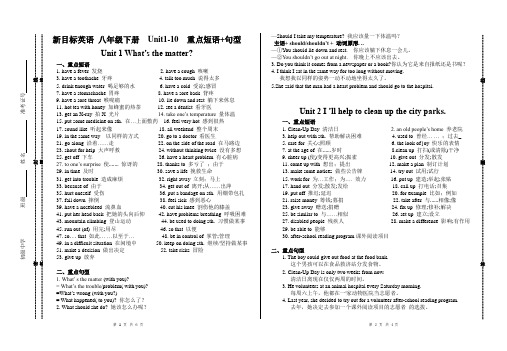
初级中学 班级 姓名 准考证号……………………………密……………………………………………………封…………………………………………线……………………… ……………………………答……………………………………………………题…………………………………………线……………………………………………………答……………………………………………………题…………………………………………线………………………新目标英语 八年级下册 Unit1-10 重点短语+句型Unit 1 What’s the matter?一、重点短语1. have a fever 发烧2. have a cough 咳嗽3. have a toothache 牙疼4. talk too much 说得太多5. drink enough water 喝足够的水6. have a cold 受凉;感冒7. have a stomachache 胃疼8. have a sore back 背疼9. have a sore throat 喉咙痛 10. lie down and rest 躺下来休息 11. hot tea with honey 加蜂蜜的热茶 12. see a dentist 看牙医13. get an X-ray 拍X 光片 14. take one’s temperature 量体温 15. put some medicine on sth. 在…上面敷药 16. feel very hot 感到很热 17. sound like 听起来像 18. all weekend 整个周末 19. in the same way 以同样的方式 20. go to a doctor 看医生21. go along 沿着……走 22. on the side of the road 在马路边 23. shout for help 大声呼救 24. without thinking twice 没有多想 25. get off 下车 26. have a heart problem 有心脏病 27. to one’s surprise 使....... 惊讶的 28. thanks to 多亏了 ;由于 29. in time 及时 30. save a life 挽救生命 31. get into trouble 造成麻烦 32. right away 立刻;马上 33. because of 由于 34. get out of 离开;从……出萍35. hurt oneself 受伤 36. put a bandage on sth. 用绷带包扎 37. fall down 摔倒 38. feel sick 感到恶心39. have a nosebleed 流鼻血 40. cut his knee 割伤他的膝盖41. put her head back 把她的头向后仰 42. have problems breathing 呼吸困难 43. mountain climbing 登山运动 44. be used to doing sth. 习惯做某事 45. run out (of) 用完;用尽 46. so that 以便47. so. . . that 如此… …以至于… 48. be in control of 掌管;管理49. in a difficult situation 在闲境中 50. keep on doing sth. 继续/坚持做某事 51. make a decision 做出决定 52. take risks 冒险 53. give up 放弃二、重点句型1. What’ s the matter (with you)?= What’s the trouble /problem( with you)? =What ’s wrong (with you?)= What happened( to you)? 你怎么了? 2. What should she do? 她该怎么办呢?—Should I take my temperature? 我应该量一下体温吗? 主语+ should/shouldn’t + 动词原形. ..—①You should lie down and rest. 你应该躺下休息一会儿。
2020年春人教新目标英语八年级下册Unit-1-单元重点短语句子
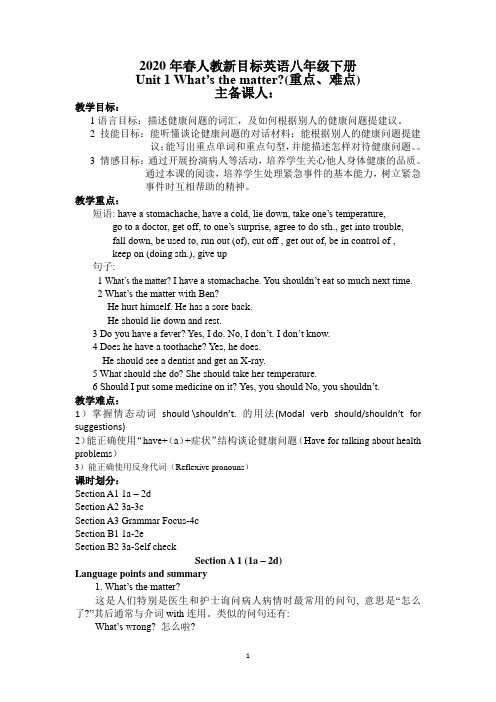
2020年春人教新目标英语八年级下册Unit 1 What’s the matter?(重点、难点)主备课人:教学目标:1语言目标:描述健康问题的词汇,及如何根据别人的健康问题提建议。
2 技能目标:能听懂谈论健康问题的对话材料;能根据别人的健康问题提建议;能写出重点单词和重点句型,并能描述怎样对待健康问题。
3 情感目标:通过开展扮演病人等活动,培养学生关心他人身体健康的品质。
通过本课的阅读,培养学生处理紧急事件的基本能力,树立紧急事件时互相帮助的精神。
教学重点:短语: have a stomachache, have a cold, lie down, take one’s temperature, go to a doctor, get off, to one’s surprise, agree to do sth., get into trouble,fall down, be used to, run out (of), cut off , get out of, be in control of ,keep on (doing sth.), give up句子:1 What’s the matter? I have a stomachache. You shouldn’t eat so much next time.2 What’s the matter with Ben?He hurt himself. He has a sore back.He should lie down and rest.3 Do you have a fever? Yes, I do. No, I don’t.I don’t kno w.4 Does he have a toothache? Yes, he does.He should see a dentist and get an X-ray.5 What should she do? She should take her temperature.6 Should I put some medicine on it? Yes, you should No, you shouldn’t.教学难点:1)掌握情态动词should \shouldn’t. 的用法(Modal verb should/shouldn’t for suggestions)2)能正确使用“have+(a)+症状”结构谈论健康问题(Have for talking about health problems)3)能正确使用反身代词(Reflexive pronouns)课时划分:Section A1 1a – 2dSection A2 3a-3cSection A3 Grammar Focus-4cSection B1 1a-2eSection B2 3a-Self checkSection A 1 (1a – 2d)Language points and summary1. What’s the matter?这是人们特别是医生和护士询问病人病情时最常用的问句, 意思是“怎么了?”其后通常与介词with连用。
- 1、下载文档前请自行甄别文档内容的完整性,平台不提供额外的编辑、内容补充、找答案等附加服务。
- 2、"仅部分预览"的文档,不可在线预览部分如存在完整性等问题,可反馈申请退款(可完整预览的文档不适用该条件!)。
- 3、如文档侵犯您的权益,请联系客服反馈,我们会尽快为您处理(人工客服工作时间:9:00-18:30)。
Unit 1Will people have robots?1.be free 空闲的2.on computer 在电脑上on:表示使用通讯工具、信息或传媒,乘坐交通工具等eg.I don’t want to talk about it on the phone.in:使用语言文字等媒介;eg. Can you speak it in English?with:借助具体的手段或工具eg. Don’t write it with a red pen.3.live to be + 岁数+years old活到…岁4.fewer +可数名词复数更少...5.less +不可数名词更少的…6.(many /much) more +可数名词复数/不可数名词更多的…7.be crowded 拥挤的8.in 100 years 100年后(一般将来时)in + 一段时间(以现在的时间为起点), 用将来时态, 提问用how soon(多久以后) ;也可用于过去时, “在…时间之内”; 区别于after+一段时间(以过去的时间为起点), “在…之后”, 只用于过去时9.five years ago 5年前(一般过去时)10. sb. will be +职业某人将成为…11.live in …住在…12.fly to the moon 飞到月亮上fly to… = go to … by plane 飞往….13.fall in love with …爱上…14.be able to do sth 能够…15.keep a pet 养宠物e true 实现17.hear of …听说…18.in the future 在将来(强调将来的某一时期)in future “将来”(全部的将来)for the future “将来”(全部的将来,往往含有跟以前不同的意思)19.help sb (to) do sth = help sb with sth帮助某人做…20.hundreds of 数百21.thousands of数千22.try to do sth = do one‟s best to do sth 尽力做…try not to do sth尽力不做…23.make/let sb do让某人做… (make有强迫的意味)24.the same as …与…相同25.look like …看起来像…26.wake up 醒来27.It‟s +形容词+(for sb/of sb)+to do sth 对某人而言,做某事是…的(of描述人的特征; for描述事情的特点)28.over and over again 反复,一遍又一遍29.look for …寻找30. Do you think …?I think (that)….I don’t think (that)….31. 一般将来时的三种基本结构:⑴will +V.⑵be going to +V.⑶be + V-ing (go, come, leave, start, begin, arrive etc.)[4] be to do 表示将要发生的动作[5] be about to “即将做…, 不久就要…”一般将来时的时间状语:in + 时间,in the future,next + 时间,与tomorrow 相关的时间,this + 时间,from now on,right now etc.32. there be 的将来时:There will be sth.There is /are going to be sth.Unit 2What should I do?1.keep out 不让….进入2.want sb to do sth =would like sb to do sth= feel like doing sth 想要某人做…3.argue with sb 和某人争吵argue about/over sth 为某事争吵4.out of style 过时in style 流行的5.adj/adv +enough足够的… (good enough)enough +n 足够的(enough money)6.What‟s wrong with …? =What‟s the matter/trouble/problem with…?某人/某物怎么啦?7.call sb up =call sb = ring sb up 给某人打电话8.a ticket to a ball game 一场球赛的票9.write sb a letter =write a letter to sb = write to sb给某人写信10.on the phone 在电话上11.talk about 谈论…12.be surprised at sth/doing sth 对…感到惊讶13.get a part time job 找到一份兼职工作14.borrow sth from …从…借到…lend sth to sb = lend sb sth 把…借给…15.ask sb for sth 向某人请求16.either 也(否定句句末) ; too 肯定句句末17.buy sth for sb = buy sb sth 为某人买…18.like to do sth /like doing sth 喜欢做…19.tell sb (not) to do sth 告诉某人(不要)做某事20.else别的, 其他的位于特殊疑问词和不定代词之后(somebody else , what else)other放在名词之前21.except sb/sth 除…之外(递减);besides 除…之外还有(递加);except for 除了(不放在句首)apart from 除了(可放在句首)23.be upset 沮丧24.leave sth +介词地点把…遗忘在…25.get on/along well with sb 和某人相处得好26.have a fight with sb 与某人打架27.give some advice 提建议28.from…to 从…到…29.It‟s time for +名词= It‟s time to do sth 该做…的时候了30.as much as possible 尽可能多的plain about sb/sth/doing sth抱怨…32.take part in …参加…33.see sb doing sth 看见某人正在做某事(的片段)see sb do sth 看见某人做某事(的全过程)pare …with…把…和…作比较35.send sb. sth. =send sth to sb 送某人某物36.sb. find it +形容词+to do sth某人发觉做某事是…的eg. We find it important to learn Chinese .37.on the one hand 在一方面38.on the other hand 在另一方面40.need to do 需要做某事; need doing sth (某事)需要被做41.Sb. pay …for sth. 某人为某物花了…钱。
Sth. cost sb. …某物花了某人…钱。
Sb. spend …on sth. 某人花了…(时间、金钱)在某事上。
(in) doing sth. 某人花了…(时间、金钱)做某事。
It takes/took sb. … to do sth. 花了某人…(时间、金钱)做某事。
42. be busy doing = be busy with sth43. until 否定句中: not…until 直到…才…用短暂性动词肯定句中: “直到…为止”, 用延续性动词44. 提建议句式:①Could, should②How about…? = what about…?③Let’s ….④Shall we….?⑤You’d better….⑥Why don’t you do….? = Why not do….?45. 情态动词的基本用法Unit 3What were you doing when the UFO arrived?1.in front of…在…的前面(范围外); in the front of (范围内)2.get out of …从…出来3.take off from…从…起飞nd on …降落…5.follow sb to do sth 跟随某人做某事6.walk down …沿着…走7.jump down 跳下来8.take a photo 照像9. in the tree在树上(外来的) on the tree在树上(树本身上长的)10.run away 逃跑11.think about …考虑…12.ask sb (not) to do sth 请某人(不要)做某事13.in silence 沉默地14.at that time 在那时15.in space 在太空中16.all over the world =around the world 全世界17.happen = take place 发生(两者均无被动)happen to sb 某人发生某事; happen to do碰巧做某事情happen on 巧遇…It happened that 偶然…, 碰巧…18.hear about …听说…19.have fun (in) doing sth20.as +形/副(原级)+as …和…一样否定形式:not as/so + 形容词/副词的原级+as “和…不一样”21.过去进行时⑴用法:表示在过去某一时刻或某段时间内正在进行的动作⑵谓语结构:was/were + Ving⑶时间状语:at that time/momentat + 点钟+ yesterday/last nightfrom +点钟+ to +点钟+ yesterdaythis time yesterdayjust thenwhen he came in, ….(when引导的时间状语从句是过去时,并且动词是短暂性动词时,主句使用过去进行时)22. when & whilewhen与while都有“当……时”的意思when 可与一个点的时间或表示一段的时间连用,从句动词可以是短暂性或延续性动词;while 只指一段时间,不能指一点时间, 从句的动词必须是延续性动词Unit 4He said I was hard-working.1.have a surprise(surprising) party for sb 为某人举行一个惊喜的聚会2.get/be mad at sb/sth 对…生气/恼火3.on Friday evening 在星期五晚上4.not …any more /any longer 不再5.first of all =at first 首先6.at the bus stop 在公共汽车站7.pass (on) sth to sb 把…传给…8.be supposed to do = should 被期望或被要求…, 应该…9.be good at =do well in +名词/代词/doing sth. 在…方面做得好be better at =do better in +名/代/doing sth. 在…方面做得更好10. be sorry to do11.have a cold12.be hard-working 勤奋的13. be/keep in good health = keep/stay healthy 保持健康14.end-of-year exams 年终考试15.report card 成绩单16.get +形容词变得…(例get tired/get angry/get nervous)17.be surprised to do sth 对做某事感到惊讶18.have a hard /difficult time +doing sth./with sth在…方面很费时间/在…方面不顺利19.get over …原谅/克服…20.one‟s own sth 某人自己的事物(my own work)21.forget to do sth 忘记要做某事forget doing sth 忘记做过某事22.change one‟s life 改变某人的生活23.sound like +形容词听起来…24.open up one‟s eyes to …开阔某人的视野25.there times a day 一天三次26.both…and…两者都…most of …在…中的绝大多数between…and…在…与…之间27.feel lucky 感到幸运的28.some of …在…中的一些one of …在…中之一30.return to…回到…return sth to …= give back sth to…把…还给…31.open up 打开32.care for 照顾※33.直接引语和间接引语(详细见P98)①人称②时态③状语④句型Unit 5If you go to the party, you’ll have a great time!1. have a great/good time =have fun = enjoy oneself 玩得高兴,过得愉快2.go to the party 去参加聚会3. let sb. in/out/by让某人进来/出去/过去4.wear jeans 穿牛仔裤wear 穿着, 戴着, 表示状态; put on穿上, 戴着, 表示动作;dress 穿上, 穿着, 既表示动作也表示状态, dress sb 和某人穿衣服5.be late for 迟到6.be sorry (that)…感到遗憾anize sth. for …为…组织某事8.half (of) the class 半班9.take away 拿走10. clean up 收拾干净11.all the time = always 总是,一直7.make a living 谋生make a living by…通过….谋生8. in order to do sth. 以便、为了that + 目的状语从句= so thatin order 整齐、有条理、正常9.study for …test 为…考试而学习10.end-of-year party 年终晚会11.travel around the world 环游世界12.make a lot of money 赚很多钱13.get an education 受教育14.in fact 事实上15.a professional soccer player 一名职业足球运动员160. decide to do sth. 决定去做某事17.get injured 受伤18.be famous for…因…而出名be famous as…以(作为)…而出名19.too much+不可数名词too many+可数名词复数太多的…20.much too +形/副词实在太…21.so much +不可数名词so many +可数名词复数如此多…※22. if条件状语从句: 从句用一般现在时, 主句用将来时(黄金考点)※23. 条件状语从句(详见P100表格)①在条件状语从句中,主句是将来时、祈使句或含有情态动词的句子时,从句要使用一般现在时表达将来的意思②从句引导连词: if, unless, in case, even if, as long as, so long as, supposeUnit 6How long have you been collecting shells?1.How long …多久(对for+一段时间/since提问)How soon 多久(以后) (对in+一段时间提问)How often 多久(一次) (对频率提问)2.start class/skating/to skate = begin class/skating/to skate开始上课/滑冰3.a pair of …一双、一条、一副…4.raise…for 为…筹集..(raise money for charity 为慈善机构募捐)5.the first …to do sth 做某事的第一个人eg. She is the first student to get to school .6.the whole five hours =all the five hours 整整五个小时7.three and a half years =three years and a half 三年半8.Sb.run out of sth.某人用完了某物9.thanks for sth /doing sth 谢谢你…10.by the way 顺便说,顺便问一下11.on my seventh birthday 在我第七个生日12.be interested in sth /doing sth对…感兴趣13.finish doing sth 做完某事14.more than =over 超过…,多于…15.less than …少于…16.the +比较级,the +比较级越…,就越…eg: The more trees we plant , the more beautiful our school is .我们种的树越多,我们的学校就越美.比较级+and+比较级越来越…17.far from …离…远※18. 现在完成时(详见P96)①结构:have/has been + 过去分词②表示:动作发生在过去,强调此动作对现在的影响和结果(不考虑何时发生,只考虑对现在的影响)区别于一般过去时(只表示过去的动作,不涉及和现在的联系)③标志性的时间状语:just,recently,lately,already,yet, ever,never,before④表示一段时间的时间状语:for+一段时间,since+过去的点时间/一般过去时的句子,so far,up to/till now,these days,次数⑤表示一段时间的时间状语在肯定句中要与延续性动词连用,不可用非延续性动词.说明:A.否定句没有此要求B.非延续性动词并非不能用现在完成时,而是不能与一段时间的时间状语C.常见的非延续性动词: arrive,die,join,leave,go,finish,buy, marry, borrow,lend, begin, refuse, fail, divorce etc.D.非延续性动词转换成延续性动词的方法:⑴直接用延续性动词代替: buy—have, borrow---keep, become---beput on---wear, catch a cold----have a cold⑵转换成: be + adj./adv.die—be dead, finish---be over, begin---be on, leave---be awayfall asleep---be asleep, come to/go to/arrive at(in)—be at(in), close---be closed⑥现在完成时从不与when引起的疑问句联用※19.现在完成进行时①结构:have/has + been + V-ing.②用法:A.表示从过去某一时刻开始,一直延续到现在且很有可能持续下去B.表示某种感情色彩C.表示持续一段时间内重复的动作③与现在完成时的区别:A.现在完成时强调结果; 现在完成进行时强调动作的延续B.如果明确表示动作持续到现在已经结束,只能用现在完成时C.表示某个动作已经做过多少次了,不能用现在完成进行时D.非延续性动词不能用于现在完成进行时※20.原因状语从句, 让步状语从句 (详见P100表格)Unit 7 Would you mind turning down the music? 1.turn on 打开turn off 关掉turn up 调高turn down 调低2.Not at all 不用谢Not…at all 根本不,一点也不3.right away=at once=right now=in a minute 马上,立刻4.do the dishes 洗盘子5.put on 穿上6.take off 脱下;起飞7.at a meeting 在开会at +动名词从事于…, 处于…状态, 表示动作正在进行8.wait in line=join the line=stand in line 排队9.cut/jump in line 插队10.Sth. happen to sb. 某人发生某事11.go back to…回到…12.get annoyed 变得生气13.stand in the subway door 站在地铁门口14.welcome to…欢迎到…15.the way to…去…的路16.a bit + adj.=a little + adj.= a little bit + adj. 一点…a bit of +不可数名词=a little +不可数名词17.wait for…等候…18.look up 查寻;抬头看19.keep…down压低声音20.some time 一段时间sometime 某时sometimes 有时some times 几次21.close to=next to…靠近…22.if possible 如果可能的话23.put out 熄灭24.take care=be careful 小心,当心take care (not) to do sth. 小心(不要)做某事take care of = look after 照看25.pick up 捡起26.drop litter扔垃圾27.in an English-speaking country 在一个说英语的国家28.break the rules 违反规定29.one of the +最高级+复数名词….中的之一eg.One of the most polite ways30. in public places 在公共场所in public 公开地,当众地31. help sb. do/with sth. 帮助某人做某事(回忆help的五个词组)32. return … to … = give back…把…还给…33. even if/though 尽管、即使34. all the time 一直35. seem like 看上去像…36. be polite有礼貌be polite to sb37.follow sb. around跟在某人周围38.be allowed 被允许(被动语态)39.sth happen to sb 某事发生在某人身上happen to do 碰巧做某事40.Would you mind turning down the music?你介不介意把音乐声关小呢?Would you mind (not) doing sth.? 你介不介意做(不做)…?= Would/Could you please (not) do sth.? 请你做(不做)…好吗?mind doing sth 介意做….mind one’s doing sth介意某人做…..针对其回答: Yes表示反对; No表示许可,不介意41.The pen you bought didn’t work. 你买的那把笔坏了= The pen you bought wasn’t broken.= There was something wrong with the pen you bought.= Something was wrong with the pen you bought.Unit 8Why don’t you get her a scarf?1.Let‟s do sth. 让我们做…吧Shall I/we do sth.? 我/我们做…行吗?How/What about doing sth.? 做…怎么样?Would you like to do sth.? 你想要做…吗?Why don‟t you do sth.?= Why not do sth.? 你为什么不做…呢?(注意:7、8两个单元学习的几种礼貌的提出建议的方式是重点,综合复习,注意他们的搭配)2.What should I do? 我应当怎么做?3.get sb sth.= get sth.to sb. 给某人买某物buy sb sth = buy sth for sb4.That sounds good. (sound +adj.)5.receive sth. from….=get sth. from…从某人处收到某物6.leave school 毕业,离校7.mouse老鼠----mice <复数>8.a six-year-old child 一个6岁的孩子9.too +形/副+to do sth. 太…而不能…= not… enough to do = so… that 主语can’t ….eg. He is too young to go to school.= He is so young that he can’t go to school.= He isn’t old enough to go to school.= He is very young and he can’t go to school.PS: too…to…是一个简单句,而so…that…是一个复合句。
